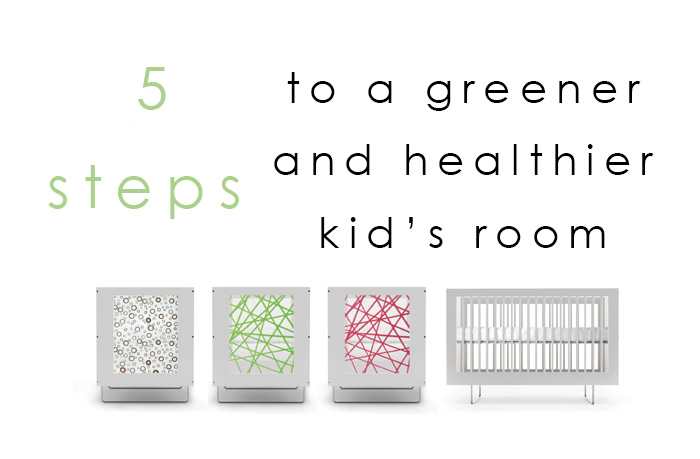
5 Steps to a Greener, Healthier Room for Your Child
It begins as a nursery. A crib, a changing table, late night feedings. Then before you know it, the crib is replaced by a toddler bed, and then a twin bed. The Diaper Genie is replaced by a rocking horse, which is eventually traded in for a train set, an art table, or a dress up chest. To me, the twins’ room isn’t just where they lay their heads down every night, it’s where they play and learn and grow. It’s where they spend many hours, both awake and asleep.
I remember when we switched to toddler beds from cribs we were maniacs for child-proofing. The idea that they were going to be free to get out of bed and touch anything was so stressful. If you’re a parent I’m sure you relate. All I want in the world is for my kids to be safe, and I realized that while less obvious than other things (anchoring furniture to the wall, plugging outlets), it’s just as important to make sure the air is safe.
What I found out upon doing a little research is really pretty terrifying. The materials used to make cribs, changing tables, beds, mattresses, and other furniture often found in kid’s rooms (as well as the paint) let off some pretty nasty gasses, including formaldehyde, which is known to cause cancer, asthma, and a slew of other illnesses. Not good.
So what can we do to make sure our kids are safe from all the potential hazards a bedroom can present?
Use safe, sustainable furniture. I am totally in LOVE with Spot on Square, a green furniture company started by a couple who wanted safe, beautiful items for their children. I’m basically dying for this gorgeous twin bed, x2 for Alice and Charlotte. They also carry convertible cribs if you’re starting nice and early. 🙂
Test for radon. It doesn’t matter whether your home is new or old, you could have a radon problem, which can significantly increase your (and your child’s) risk of lung cancer.
Make sure your paint is safe. It’s important to use Zero-VOC paint on the walls of a child’s room, not just on their furniture. Paint containing VOCs emit harmful fumes long after the paint has dried. Non-VOC paints are water based and emit little to no hazardous fumes while wet and none whatsoever once cured.
Vacuum with a HEPA filter. This is not just about dust, dander, and other gross stuff you think of when you think of vacuuming. If you get a quality vacuum with a HEPA filter you can actually rid your home of decades of lead residue.
Use the right mattress. What your child’s mattress is made of is just as important as what the furniture is made of. The foam in mattresses can be toxic, so make sure you get a safe, natural (and comfy!) mattress like this one from Nook.
These are just a few of the big changes you can make to greatly increase your child’s safety, as well as your impact on the Earth. If you’re interested in starting a little smaller, Modern Kid’s Design carries several beautiful lines of safe, eco-friendly toys for a wide variety of ages. Alice and Charlotte just got several of the Melissa and Doug wooden toy sets for their birthday, and they love them. (The cutting fruit set is a particular favorite, I highly recommend it!)
What steps do you take to make sure the things in your child’s life are safe? It’s great to hear new tips!
This guest post was written by Johanna from Our Joyful Home.

